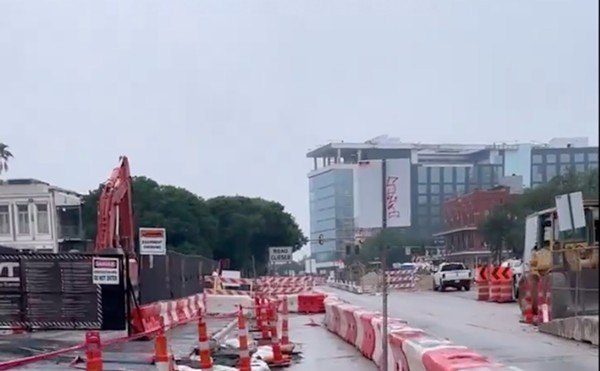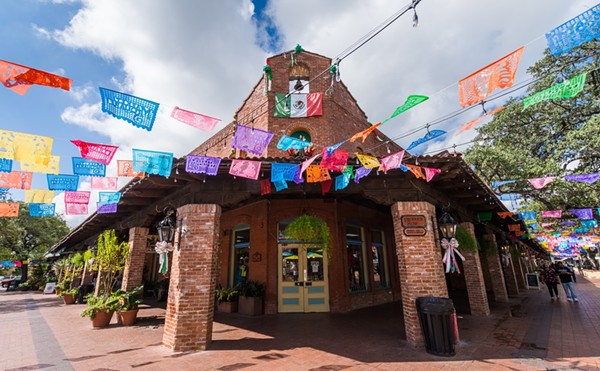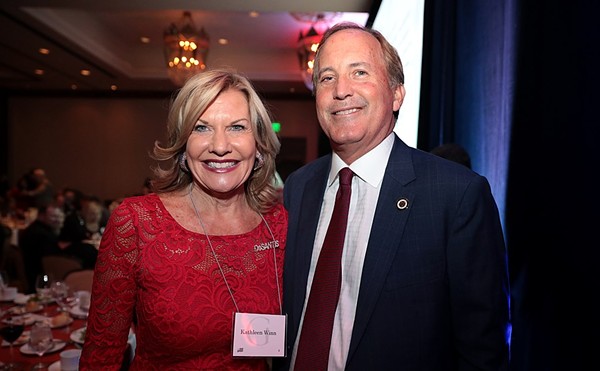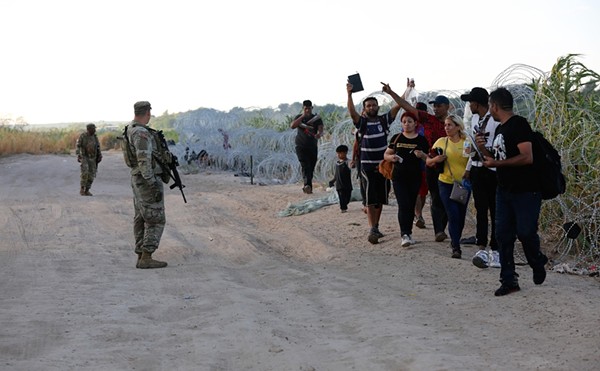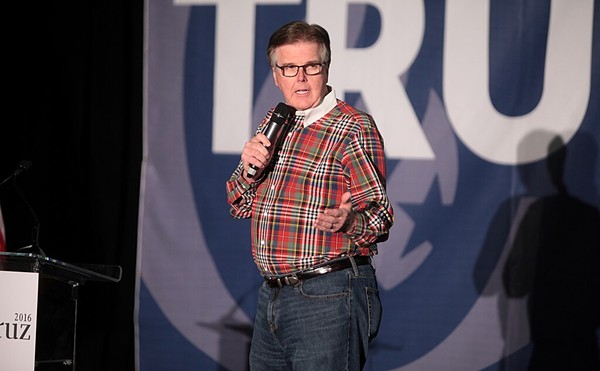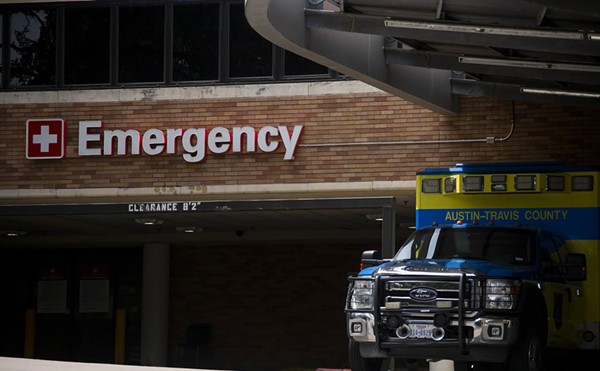Eddie Cruz is one of the two sons Ram Ayala had with Tina Cruz, and a man on a quest: to take over the annual event that has been honoring the memory of his dad for the last six years. Or more, if you ask him.
This is what he told the Current via phone and during a meeting at a British pub in Alamo Heights.
So … what’s up with the Ram Jam?
There’s a lot of things going, there’s people fighting against me, and [people] fighting with me. I’m taking over the Ram Jam thing. There’s no doubt about that. We actually started it, me and my brother [Mark]. The next day after my dad died, we opened the doors at Taco Land, and the bands were there. We actually opened the door and we created that Ram Jam for the fact that my Dad died and that’s how he wanted to be remembered. We did it for a couple of years.
You called it the Ram Jam?
And a lot of times all these people started doing stuff on their own because we’re going through litigation. What happened was, when my dad died, everybody came out of the woodwork. All these people, “Oh, I knew him! I partied here with him! I partied there with him!” I mean, everybody all of a sudden knew him really, really good. My dad knew a lot of people, a lot of people. But after a while, we started realizing that people were taking advantage of his name. For instance, this whole Ram Jam thing. You know, it might be a word or it might be a name, but when my Dad had a birthday party, it was just a party. You know what I’m saying? Everybody went over there, they gave him cake, and they had parties here, parties there, bands played, but it wasn’t technically considered a Ram Jam.
But what’s the problem with anybody trying to honor Ram? If it was my dad, I’d be thrilled.
The Ram Jam is what it is, but it doesn’t come without some kind of benefit as well. When we first opened those doors the day after my dad died, we said, “Everybody come over here and play, celebrate,” all that stuff. People want to donate or whatever? That’s fine. The next year, the same thing.
What did you call those meetings?
We called that the Ram Jam because he died. We didn’t celebrate on his birthday, we celebrated on his death day. Who celebrates someone on their birthday when they’re not alive? That’s what we started calling it. That was in 2005. Then, the next year we started holding the benefit for the people that passed away, which was at the Josephine Theater. We were a part of that, we were the ones that allowed that to happen. It was me, my mother, my brother, and we had Jerry Clayworth get involved. What happened was, all of a sudden, like I said, people came out of the woodwork. And my Dad had been involved in something else …
The Ayala family.
They claimed ownership of Taco Land. From there, I had to give the keys from my dad’s bar to the court. I had the keys to open the bar and everything. We go to court for this. Everything stops, everything stays still, nobody can do anything because we’re going to court. I can’t go and say “Taco Land this, Taco Land that.” They can’t go anywhere saying “Taco Land this, Taco Land that,” because we’re going through litigation. Nobody had the right to say anything because we had to prove who we are, so everything stops. The court finally says, “OK, [Agnes Ayala] got a marriage license, OK, fine, then you are the soul proprietors of Taco Land. They were never involved with the Ram Jam or anything. They were never involved with the bar at all itself.
Weren’t the Ayalas at all in touch with Ram?
They were in touch with him, but they were never involved with the bar. They were in touch with him on the outside. It’s like an Arnold Schwarzenegger thing. Think of it like that. All this time everybody knew about Maria, and nobody knew that he had a kid 10 years later. That’s exactly the way you should look at it. So [Ram] has another family, and we go to court, everything stops.
Here’s where it gets dirty. Jerry Clayworth realizes that my mother can’t seem to find the marriage license, so the court automatically rules for the other family, which is not a problem, but we are still alive. So we turn around, we submit papers to the court, and we’re going through litigation. Now that [the court] realizes that we’re the children, we’re like, “OK now, how are we going to do this?”
So from there Jerry Clayworth realizes, “Eddie Cruz [doesn’t] have anything to do with this, so I’m just gonna go with Agnes Ayala,” which is my dad’s first wife. He goes over there and [tells them] about how he knew my dad for 20 years, and they start believing it. So he starts doing these little Ram Jam things. We [had] already told him, “Don’t do it, don’t do it, don’t do it without us.” He still did it.
So now you’re finally ready to do it on your own?
I’d arrange with the other side of the family now. It took a while, but now I arrange with them.
What?
Everything is good to go, nothing’s wrong.
So you and the Ayalas want to take over or reclaim the Ram Jam from Jerry Clayworth and Jeff Smith?
Jeff is fine. Yeah, Jeff had the right intentions doing it. I never knew who Jerry Clayworth was. We started looking around like, “OK, who’s this Jerry guy?” When my dad died, he was the first person at the door. “I knew your dad,” so we believed him. For those two years we carried Jerry on our back and we shared a lot of memories with him, we shared a lot of stories with him …
But man, if you go to concerts in San Antonio, you have to know Ram. And what is the problem if someone wants to honor him?
I know what you’re saying, but when Jerry said stories about how he knew my dad, we found out it was a lie. We found out a lot of things. We asked Jerry, “Hey, Jerry, what’s my dad’s middle name?” And he didn’t know. He goes, “He didn’t have a middle name.” My dad has a middle name. So that’s why I was a little upset about why these Ram Jams were happening.
Oh, c’mon…
So I got with the family and I told them, “Look, Jeff Smith’s got good intentions, but the problem is, the Ram Jam is starting to separate from its true intentions.” The true intention of the Ram Jams were to offer back to the community what my dad did. My dad would open the door and say, “Hey, come in if you need a beer.” He was real nice, he wasn’t one of those guys who was like, “You owe me this, give me this, give me that.”
So you don’t have a problem with Jeff Smith?
Jeff is an excellent person. Jeff is not the problem, the problem here is that I talked to Jerry first. That was my mistake. I talked to Jerry and I said, “Look, I wanna get involved in this, I wanna help you out with this Ram Jam. I wanna start working on submitting a scholarship, I wanna make this big.” He got upset and he turns around and tells Jeff a whole bunch of different stories saying that I want to take it over. Now, I didn’t want to take this over. I wanted to help Jeff. Jerry responded saying he doesn’t want anything to do with me. Hey, my dad might be dead, but let’s keep it going. What do you have to offer? Come to the Ram Jam, you’re a new band, we’ll give you a shot. That’s what I wanted to do. I wanted to offer scholarships for the kids, maybe $1,000, maybe $1,500…
But why now? Why wait six years to become interested in the Ram Jam?
For that, we have to go all the way back to the day of the murders … You know, we were going through litigation. The courts already assigned the executive to the property [to] me and my step-sister, Sylvia [Navarro]. We’ve already come to terms and said, “We’re [accepting] each other [and] we’re going to split this right down the middle; This is where we’re going with the Ram Jam.” … Any litigation starts with an argument, with a fight. At the end of a litigation you either make up and move along together or you don’t make up, and you just separate and collect the proceedings. We made up. We got together and we said, “This is important.” Then we got together as a family, as two into one.
What about separate Ram Jams? If the idea is to honor Ram, isn’t the more the better?
It would probably be best if it [was] just done by one person ... When I spoke to Jerry [Clayworth], he said they had been doing it since 2005. We did it twice. We did it the first two times, [and] he was there to help me. Here’s the problem: They went out to the media and started saying, “We’ve been doing the Ram Jam for six years.” … You know, there had been parties when my dad died, and when my dad had a birthday, he had parties. Bands played and they had cake and everything. But you can’t say, “We just started the Ram Jam five, six, years ago,” after he’s dead.
Let’s go back in time for a second: When did you live together with your dad?
My brother [Mark] was born in ’67, I was born in ’70, and we lived together since, well obviously since my brother was born, probably until about ’78, or ’77.
How much do you know about Taco Land Studios, LLC?
These are the new people that bought the bar. They bought the bar from us, me and my sister. Whenever you have property like this, you go to court so they can assign what they call executives of the property. As executives, you’re the power of attorney for the property. So I had one half power of attorney and my sister had the other half. … Last I heard they wanted to keep it [as] Taco Land. As far as the dates opening I haven’t heard of them opening anything. They haven’t done any renovations or anything that I could see. I’m not going to be running the place anymore. If anything, I would love to help [with] anything to do with my dad’s bar.
What’s the deal with your last name?
In the beginning we were Ayalas, [but] my mother changed the name because she didn’t want to be related with [boxer] Tony Ayala [convicted of rape]. I have the birth certificate that says Ayala and then [an amendment] on [the] back.
Early on you said that, in order to understand why you all of a sudden are interested in Taco Land, we needed to go back to the day of the murders.
Right. Obviously, when my dad passed away we were shocked. As a matter of fact I was supposed to be there, but I didn’t make it on that night. I was supposed to be there with him. I was probably going to go by, and usually what I [did] is I’d go over there and hang out with him, and I’d be his security, just kinda like in case anything happens.
What about Doug [Morgan]?
Doug was a door guy, [Denise] Sunny [Koger] was the bartender … I was the son. I always would just go there, every now and then just pop in there, and we would just be there drinking. But I would be his sort of security. It never was officially, “That’s my bouncer,” or anything. But when something would happen my dad didn’t have anybody to actually grab somebody and throw them out … So I would take it upon myself to … talk to people, but sometimes it would get a little stupid. We’d go over there and help him out. If nothing would happen, we would all have a good time.
Well I didn’t go [that night] and, as a matter of fact, I can’t even remember the reason why; I just know that I was supposed to be there. Oh, it was the Spurs game. [But] I was at home not really doing anything, just relaxing, not doing anything. You don’t think about these things, you know, you don’t think that something’s going to happen. It wasn’t one of those things like, “Maybe I should be there, maybe I shouldn’t.” I was going to go by just for the heck of it, but I didn’t do it.
I get a call and I rushed to the hospital.
What time was that?
I can’t really say what time it was. I know it was right after it happened. My brother and mother didn’t want to go, they were already distraught. Usually I’m the rock [on] our side of the family; I’m the strongest one. So I went over to the hospital, and my brother was just like, “Yeah, let me know.” Finally I showed up to the hospital, I was the first one there. They asked me who I [was], I [told] them who I am. My mother shows up. It was maybe about … two-ish, somewhere around … It’s really hard to say.
I remember looking at my dad. He had already passed away. Me and my mother were able to see him. My brother never showed up, he didn’t want to go. My brother was extremely close to my dad. He still is to this day. When the birthday comes and the death day comes, he starts breaking down. So I have to be there to kinda like, “let’s go, let’s move on.” … My brother was my dad’s firstborn on our side, so he took it really hard. So anyway, I saw my dad, he was laying there in the gurney. I took the sheet off his head and I saw him. Really bad, I mean at that time we’re all in shock, I mean we didn’t know what to do, we’re all just kinda like, “What do we do?” We start collecting some of his stuff, they give us a brown paper bag of some of his clothes and everything. My mother takes them and I’m still there.
Then another guy comes in there, a taller guy, and he starts crying and I’m like, “Yeah, you know, I know how you feel.” I don’t know this person, so we’re there with my dad, and we’re like this looking at him and he’s on the other side, and it turns out that’s his other son. I was like, “What?!” But at that time I controlled myself and just shook his hand and gave him a hug. So there I am, mourning the violent loss of my father, and at the same time discovering that I had a brother and that my father had two families.
See, you gotta remember: my dad knew a lot of people, and as soon as my dad died, a lot of people came out of the woodwork, a lot of people. So I shake his hand and I give him a hug, and I give him time alone. I walk away, I give him time alone. And at that time, we’re automatically the immediate family. Me and my mother talk to the physicians and they explain to us what happened. They couldn’t save him. They tried everything they could do. They would offer us consolation and everything. And at the time, we’re like, we just don’t know what to think. We’re like, “Oh my God, how did this happen, why would this happen?” We were confused.
I had an extra set of keys to the bar, in case something like this would [have] happened, or if he needed me to open up or he needed me to close or whatever. So we go back to the bar and we locked up the bar and we start cleaning up everything. Everything was not that bad, but we start cleaning up everything. The investigators had already done what they did, they collected the evidence, and we stayed at the bar.
What about Manuel?
After that I never saw Manuel. Again, we don’t know who these people are. My mother goes to the bar, I go to the bar, my brother goes to the bar, and we’re there at the bar thinking, “What’s going on, what are we gonna do?” We’re still kinda shocked and confused. Everyone’s calling and knocking on the door and we don’t want to open the door to anybody.
The next morning, somebody else goes over there, and they start knocking on the door and we’re still there. It’s probably about 8 or 9 in the morning. We had been awake all night. So, [a man] knocks on the door and says, “Oh, well, that’s my father.” I was like, “What?” That time we didn’t know what was going on or who was who. But we knew who we were.
But who was that man knocking? It wasn’t Manuel?
This was another guy. … What happens is, this guy starts knocking on the door, and we say, “We don’t know who you are, guy.” He’s all like, “I’m so-and-so” and everything and we don’t want to let him in, because people were already starting grouping up there. We didn’t open the door, we left it closed. So I’m talking to my mother and my brother said, “What do we do?” I said, “Well, what can we do? Why don’t we just go ahead and let the police do their thing? We have a lot of things to deal with here. Why don’t we just go ahead and … open the bar up, give out the beer and we’ll see if they want to remember him outside, maybe play some music or something.”
So at that time, Jerry Clayworth comes in the door, and we’re like, “Who are you?” And he’s like, “Oh, [Ram] was a very good friend of mine.” He’s talking to my mother. “He’s a very good friend of mine, I’ve known him all these years.” … He just kinda pretty much laid it on us, and we bought it. We let him in. We start telling him what’s going on, what we’re doing, how we’re doing it. He’s all like, “I know some people, I can make some calls.” I said, “Alright, if you want to help us out, that’s great.” So now we’ve decided to go ahead and, instead of mourning his death … let’s start celebrating his death, that exact day. So people started coming over, setting up, we started putting the beer out, all the beer that was there, we put it out. First the bands started playing, by that time it had already gotten big. Everybody started showing up, the media got there, the Express-News got there, they were interviewing me and my brother. It was bad, it was really packed. The police even were blocking the roads off. So we did it for two days, two days. The next day we did it again. This time we’re completely out, beer’s all gone, but everybody came and remembered.
No other events happened after that. No other events happened in 2005. The only event that happened was me, my brother, and my mother and the bands outside, the day after he died, and the next day after. The next year comes by and we have it at the Josephine Theater. Jerry Clayworth is involved. He was helping us out in 2005, but he’s not going to want to take credit because he just kinda helped out. It wasn’t one of those things where you’re automatically making it into a business or a moniker, or some kind of cliché name. It was one of those things where we kinda put it together as, “Let’s all get together and jam with the Ram.” He’s dead, in heaven. That’s the way we saw it as. We never named it the actual Ram Jam until towards the end [of 2005], when we started thinking about it. “Yeah, let’s go ahead and do it again.”
So 2006 rolls around and we did it again. Now then we officially named it the Ram Jam and Clayworth was helping us out. So we had that benefit at the Josephine Theater. Now again, nobody had any other events. …
At that time we had already established that my father has had a different family. He had another family before and they were the ones that were fighting for the property. They never came around. Nobody even knew them. Nobody had ever met them. Everybody at the bar knew us … Even the bartenders were all like, “Yeah, I don’t know who these people were.” Now probably people know them. But back them nobody know who they were. So that’s where this all starts getting mixed up. So for the second event we had already started going through litigation. Meaning: we’re [trying] to prove who we are. … We were proving that we were heirs … that [Ram] had a relationship with my mother. That was the whole idea behind the litigation. [The Ayalas] were saying it wasn’t true and they wanted to go ahead and start the process of taking the property and doing whatever they were going to do with it, which was most likely sell it. And we were like, “No, we’re part of the heirs too.” So we had to go get a DNA test, go to court, and start proving who we were. From 2006 and all the way up to 2011, almost today we had been going to court. Finally, we were [recognized] as a part of the family. “So now ya’ll are going to have to work together to get this resolved.” … Now we’re like this [makes finger gesture meaning “united”]. Before we were like this [hands apart]. …
Did you ever find Tina’s and Ram’s marriage certificate?
She could not find the marriage record that she had. She had a marriage record, but they had gotten married out of Mexico. You’ve got to remember, my mother is maybe 11, 12 years younger than my dad, so she was young. She was born in ’44, and my brother was born in ’67, so what does that make her?
23?
So we’re going to court and at that time Jerry Clayworth says, “Oh, well, then you’re nobody and [the Ayalas are] somebody.” He pretty much cuts us off … So he turns around and goes to the other family and gives them the sad story, the same story he gave us when we first met him. … My mother told him, “Do not do it,” [but] he still did it. So we’re like, biting our tongue, holding ourselves and … we don’t want to get involved with this right now. “Let’s go ahead and stick with what we got to do. Focus on the litigation, focus on the property, and we’ll worry about the Ram Jam later.” So years pass by and we’re still going through litigation. … We’re trying to figure out how many assets [Ram] had. … That’s when they came with the marriage license and we had to relinquish our key to the property to them.
I had talked to Manuel, my step-brother, and we had made an agreement. I said, “Look, you’re not going to take anything out until we’re all there, we’re all going to take it out together.” … Well, not even a week later they started taking everything out of the property. They threw a bunch of stuff in the dumpster, a bunch of posters, a bunch of stuff that people would pay a lot of money for or even die for. They threw a lot of stuff away in the dumpster and took the jukebox out, they took the coolers, they gutted that place. There was nothing I could do. Nothing I could do.
He broke the promise?
He broke the promise. We’re upset about that because you’re not supposed to do that. So this is why we had to go to court, ’cause now we want to know where all those things went. All these sentimental things that we thought [were] important to not only us, but the general public out there [who actually] went to my dad’s bar. If you could go right now to my dad’s bar and let somebody in there that was a fan, [he] would take something from the wall. Even if it was just a piece of dry wall, that’s how popular [Ram] was. They would take a piece of tile if they could from inside. … It was no longer an easy process of, “Let’s separate this, let’s separate that, and let’s go ahead and sell the property.”
How do you know this?
I got a phone call, ’cause the locals there said, “Hey, what’s going on here? They’re throwing a whole bunch of stuff away, come over here!” I was not even anywhere near. … This was probably about maybe six to eight months after [Ram] passed. I know it was that same year, or maybe beginning of ’06. It was during the day. They started clearing it out in the morning. … But by the time I got there there was very little, little, little things in the dumpster. Like little beer tabs and stuff. But somebody else had told me that they had taken a whole bunch of stuff out of there, the posters, a Crown Royal bag full of money that [Ram] put his tip money in, a whole bunch of memorabilia, but people had already scavenged through it. So when we had found that out, we were like, “Whoa, that wasn’t part of the agreement.”
Years are passing by, and I’m like, “You know what? Why don’t we open it?” And they said, “Well, you’re going to have to buy our part out.” “So how much do you want?” “We want at least $250,000.” I can’t come up with that money for the place, to buy them out. I say, “Let us open it, let us make some money, I’m sure we can come up with the money.” They said, “No, we’re going to sell it.” Now we have to agree to sell it. I’m holding off, I don’t want to sell it. I’m holding off, trying to [find out] where’s the rest of the stuff, and they’re trying to sell it.
… At that time me and my step-sister had already gotten real close, we kinda forgot about all the bad things. … They’re real private. In fact, one of the conversations I had with Manuel when I shook his hand, the reason why [they] didn’t come to Taco Land was because [they] didn’t like the way dad’s name was involving the bar, Ayala and the bar. They’re real Christian and very religious, which I can respect.
I tell my brother, I’ll sign off at $400,000, so I sign off and the person says, you know what, we don’t want to buy it for $400,000. They back out. So then they come out with another proposal for $325,000, and now my step-sister said, “Will you sign off for $325,000?” And I said, “Not really. You know what? I tell you what: I will sign off if you let me and my brother run this Ram Jam without any issues. I don’t want any problems from anybody. You let me and my brother take over it and we will just continue to run it, we’ll do it and that’s it.” … So I signed the contract. It says $325,000, the Ram Jam stays in the Ayala’s, Edward Cruz, and Mark Cruz’s [control]. …
So we signed that paper to sell the property, and that gave me the power to continue this Ram Jam. Remember I said I couldn’t do it before because of the whole litigation thing? Well, I can do it now. The very first thing I did was contact Jerry Clayworth and say, “Hey, I got some new ideas, I want to get involved, I want to be part of the group, I want to come up with this thing to immortalize my dad.” I’m explaining to him what I want to do, maybe get a scholarship, program, get these new bands in … I said, “Let Jeff call me and we’ll talk more about it.” He turns around and pretty much manipulates the whole story. That I want to take it over, saying all these lies to Jeff. You saw my email to Jeff, it says, “Hey, Jeff, this is Ram’s son, can you contact me?” I never said anything about taking over to him. He emailed me back and that was his response. At this point I started feeling that Jerry was feeling threatened about the whole thing. But the whole truth of the matter is: Jerry has nothing to do with it. He’s probably a little bit of the promotion part of it, maybe a little bit of the brain, but he’s not my dad.
But he never claimed he’s your dad.
No, but that’s his thing. You don’t have to claim. … I know Jeff, I met him before, he’s not a bad person, he did know my dad, they did get together. Jerry Clayworth did not know my dad. He did not hang out with my dad, he was not friends with my dad. I don’t have a problem with Jeff. I have a problem with Jerry.
I asked Jerry, “What have you guys been doing? Where does this money go? Did you get any money?” “Yes, we donated it.” “To whom? Where are the receipts?” “We don’t have receipts. We just know that we donated it to KSYM, and a couple of people.” … Do you have it on a big billboard, a big check saying saying, “Donated to KSYM” and a picture?” … No, he doesn’t have that!
Did your dad’s death affected your side of the family financially?
Not really. We all had jobs. We didn’t have any money problems, but again there’s only the three of us. On the other side of the family there’s six of them, five kids and a mother.
Did Ram ever support the other family?
I don’t know, I suppose so, because he didn’t have a will. But right before he passed away we were supposed to get a will, because he had a heart attack. We’d talk to him and he’d go, “Oh… Maybe next week.” And then this happened. He got killed. But we weren’t in dire straits for money.
Did you ever think of facing the murderer?
I couldn’t. You know what I look forward to? To the day they call me and ask me, “Would you like to see the execution?” That’s what I’m looking forward to. But I don’t really have anything to say to him. I don’t want to know anymore. Because what I know, I already got closure. [Ram] lived a long, good life, and he did what he did to help me out … (he chokes up.) That’s my closure. …
Was there a funeral?
The other family had him cremated, [but] we were never involved. We never even saw the ashes. They said they threw him in the San Antonio River. We don’t know.
They didn’t invite you?
No. So this is the type of road we had to go through to get here. So for me to say, “I want to do the Ram Jam” and for [Clayworth and Smith] to tell me what they told me is very upsetting. I went through a long road to get here, I’m here now, I want to do something now, and nobody is going to stop me.





